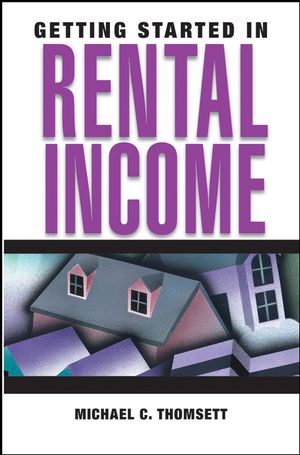Getting Started in Rental IncomeISBN: 978-0-471-71098-1
Paperback
208 pages
June 2005
 This is a Print-on-Demand title. It will be printed specifically to fill your order. Please allow an additional 10-15 days delivery time. The book is not returnable.
|
||||||
PART 1: Approaching the Market.
Chapter 1: The Traditional Approach: Buy, Hold, Hold a While Longer, Sell.
Studying the Rental Income Market.
Advantages to Long-Term Investing.
Disadvantages to Long-Term Investing.
Deciding When to Sell.
The Positive Long-Term Experience: A Matter of Management.
Chapter 2: Financial Aspects: Keeping the Cash Flowing.
Leverage and Real Estate.
Mortgage Payments and Rental Income.
Rental Expense and Tax Calculations.
Tax Planning for Rental Income Property.
Chapter 3: Fixer-Upper Alternatives: The Flipping Market.
The Flipping Concept.
Attributes of High-Potential Properties.
Quick Fix versus Expensive Problems.
Importance of Home Inspections.
Estimating Time and Cost Features.
Rental Income during Your Hold Period.
Chapter 4: The Fixer-Upper Property: Abused Homes with Potential.
Attributes of Fixer-Uppers.
The Importance of Appearance.
Recognizing Market Potential: Valuation Theories.
The Unattractive Property: A Quick Fix.
Creating a Budget.
Checklists of Neighborhood and Property.
Classifying Expenses: Cosmetic or Expensive.
The Buyer Psychology.
Chapter 5: The Combo: Long-Term and Fixer-Upper Portfolios.
Investment Portfolio Planning for Real Estate.
Conversion: Fixer-Upper to Long-Term Hold.
Fixing-Up Expenses in Conversions.
Combining Both Types in Your Portfolio: Limitations and Guidelines.
Living in Your Fixer-Upper.
Personal Limitations.
PART 2: Rental Income Investment Planning Strategies.
Chapter 6: Cash Flow First Aid: Stop the Bleeding, Do CPR (Cash-Positive Reasoning).
How CPR Works.
Studying the Essential Cash Flow Problem.
Guidelines and Suggestions: Managing the Profitable Situation.
Cash Flow and Fixer-Upper Time Restrictions.
Calculating Rental Property After-Tax Cash Flow.
Chapter 7: Taxing Matters: Inevitable but Advantageous.
Real Estate Tax Rules.
Depreciation: The Basic Rules.
Figuring the Base for Depreciation.
Tax-Deferred Exchanges.
Chapter 8: Risky Business and Rewarding Business: Comparisons.
The Nature of Risk.
Comparative Risk Analysis.
Features Defining Risk.
Tax and Inflation Risks.
Mortgage Cost Risk.
Chapter 9: Diversification and Allocation: Many Baskets and Many Eggs.
The Purpose for Diversification.
Forms of Diversification.
Why Some Portfolios Are Not Really Diversified.
Review and Change.
Chapter 10: A Long-Term Investment View.
Cash Flow versus Profits.
Identifying the Profit Margin.
The Importance of Turnover.
Fixer-Uppers and Your Financial Plan.
Long-Term Rentals and Your Financial Plan.
Checklist: The Key Ingredients.
Glossary.
Index.



